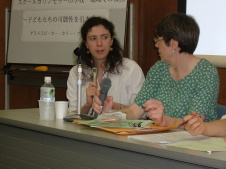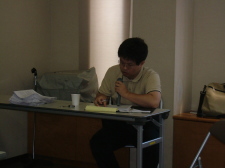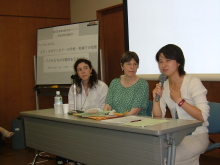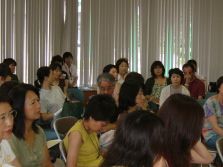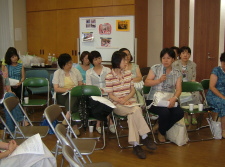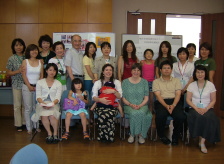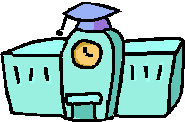The US Example

〜Bringing out children's potential〜
Guest Speaker: Mrs. Holly
Brunelli
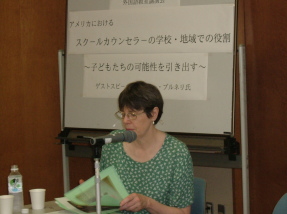
Date and
time: Saturday, August 6, 1:30〜3:30pm
Place: Aoba Community and
Cross-cultural Center
Perticipants:46persons(including guests and staffs)
Our guest, Holly Brunelli, had come
to Japan from the state of New Hampshire in the northeastern USA for summer
vacation. Using photos, she spoke in English about the role of the school
counselor in the US, what her job entails, how she teaches, the problems
children face, and community involvement. Interpreting was provided by her
daughter and son-in-law, Crystal and Masataka Kuraoka. In addition, Ms.
Yoshimura, a practicing school counselor in Japan, offered commentary and
explanations.
During and after the tea break, there were questions
from enthusiastic participants. It was an especially hot summer day, but
everyone forgot the heat as the discussion moved to the situation of counselors
and counselling practice in the US and Japan, and even Canada. 2 hours was too
short for the topic, but it gave us the opportunity to glimpse the direction
school counseling is taking in Japan, and the issues facing Japanese schools,
homes and communities.
Our guest has worked for 20 years at a public elementary school with kindergarten to 4th grade in the town of Raymond, a rural community recently becoming a suburb of Boston. She holds a Master of Education degree in School counseling. Scholol counseling in the US began career counseling at the high school level, and today the state of New Hampshire recommends one counselor per 300 students in high schools, and one counselor per 500 students in elementary schools.
The counselor visits every classroom and teaches social skills. The background of the students is diverse, so the counselor teaches a common code of behavior: how to make friends, how to deal with feelings like anger and sadness, problem-solving skills, and bullying prevention. The counselor also meets individually or in small groups with students with problems, supports and meets with parents and staff, and makes referrals to outside services. Also, as an administrator she works on school safety issues and school-community relations.
The most successful school-community program
is the Amigos program, which was started 17 years ago. High school student
volunteers serve as mentors to selected elementary school students. The students
who participate in elementary school often become volunteers in high school, and
many graduates have gone on to become teachers.
The role of the counselor is
to support the emotional and social growth of the students, and to give them
problem-solving skills they will need in school and in society. By using the
resources of the community, students have a chance ot meet with people in many
different fields. In the end, we were reminded that "It takes a village to raise
a child."
The scene of the lecture meeting:
